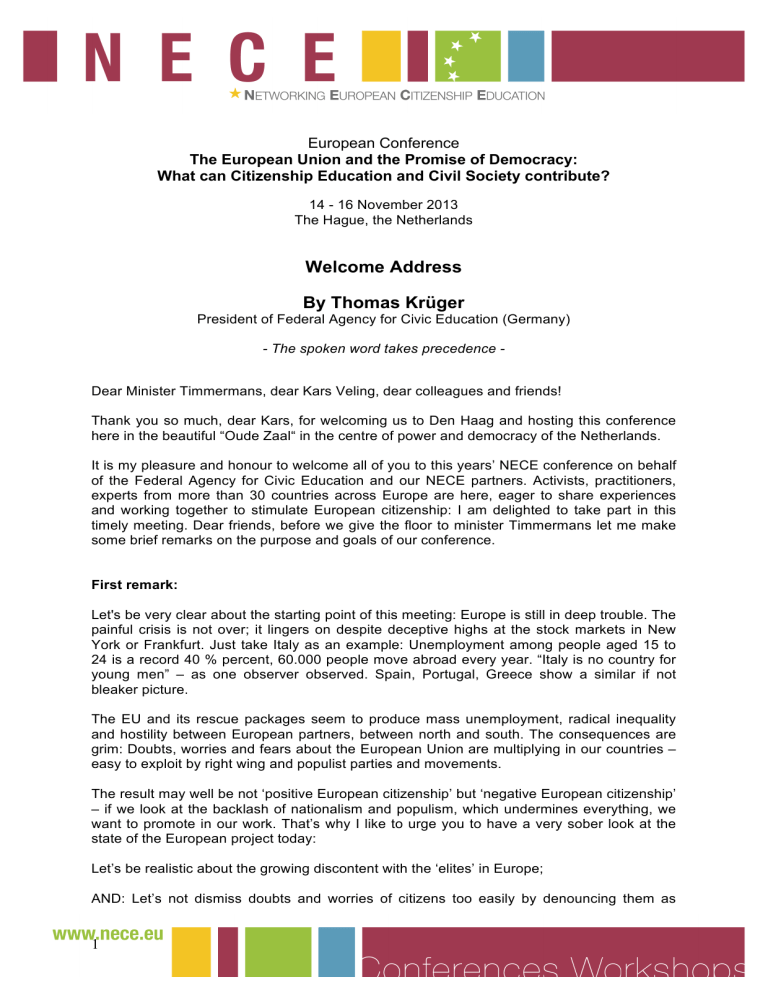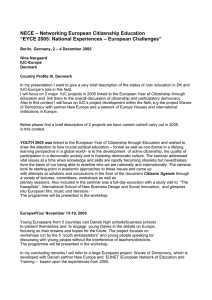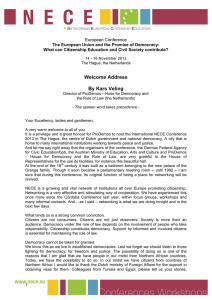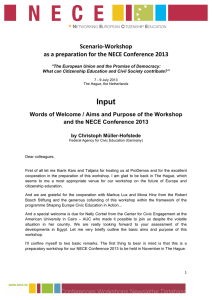European Conference The European Union and the Promise of Democracy:

European Conference
The European Union and the Promise of Democracy:
What can Citizenship Education and Civil Society contribute?
14 - 16 November 2013
The Hague, the Netherlands
Welcome Address
By Thomas Krüger
President of Federal Agency for Civic Education (Germany)
- The spoken word takes precedence -
Dear Minister Timmermans, dear Kars Veling, dear colleagues and friends!
Thank you so much, dear Kars, for welcoming us to Den Haag and hosting this conference here in the beautiful “Oude Zaal“ in the centre of power and democracy of the Netherlands.
It is my pleasure and honour to welcome all of you to this years’ NECE conference on behalf of the Federal Agency for Civic Education and our NECE partners. Activists, practitioners, experts from more than 30 countries across Europe are here, eager to share experiences and working together to stimulate European citizenship: I am delighted to take part in this timely meeting. Dear friends, before we give the floor to minister Timmermans let me make some brief remarks on the purpose and goals of our conference.
First remark:
Let's be very clear about the starting point of this meeting: Europe is still in deep trouble. The painful crisis is not over; it lingers on despite deceptive highs at the stock markets in New
York or Frankfurt. Just take Italy as an example: Unemployment among people aged 15 to
24 is a record 40 % percent, 60.000 people move abroad every year. “Italy is no country for young men” – as one observer observed. Spain, Portugal, Greece show a similar if not bleaker picture.
The EU and its rescue packages seem to produce mass unemployment, radical inequality and hostility between European partners, between north and south. The consequences are grim: Doubts, worries and fears about the European Union are multiplying in our countries – easy to exploit by right wing and populist parties and movements.
The result may well be not ‘positive European citizenship’ but ‘negative European citizenship’
– if we look at the backlash of nationalism and populism, which undermines everything, we want to promote in our work. That’s why I like to urge you to have a very sober look at the state of the European project today:
Let’s be realistic about the growing discontent with the ‘elites’ in Europe;
AND: Let’s not dismiss doubts and worries of citizens too easily by denouncing them as
1
‘populist’.
Citizenship education in Europe and about Europe is more important than ever, to be sure.
BUT is has to become more open and controversial if it wants to connect with citizens.
Fears about social justice and unemployment, worries about the non-democratic power structures in ‘Brussels’, ‘Angst’ about the undermining of ‘national traditions’, culture, identity: this complex mix of discontent, insecurities and emotional issues should become part of our debates and curricula.
Second remark:
Let’s take the EP elections in May 2014 seriously!
The success of Europhobic parties in member states is bad news for all of us who want a more transparent and democratic Europe.
Observers like Rene Cuperus here in the Netherlands and Jan Werner Müller from Princeton
University have recently warned about some disastrous figures and forecasts. Enrico Letta, prime minister of Italy, has showed his concern in a recent interview with the New York
Times, too. This will come at a time when the European Parliament has won greater powers and is lobbying for more legislative rights.
What may we face in May 2014 after the Ep elections? A strong block of populist and far right anti EU parties (European tea parties if you like) may force Europe into its own version of a ‚shut down’. Their favourite topics — immigration, austerity and the rejection of Brussels
— already dominate the campaigns.
So what are we heading for? Is a harsh black and white polarisation about Europe unavoidable? Either you are 100% pro-EU, or you are 100% anti-EU - friend or foe? In that case, there will be no place for a moderate story about Europe, making connection to the large majority of the European population, which is neither fanatically nationalistic, nor fanatically ‘europhoric'.
Again, we have to find a new narrative for European citizenship! Let us not fall back on a
TINA (there is no alternative) rhetoric, which has done so much damage in the European crisis.
Third and last remark:
“Europe and the promise of democracy” is the title of this conference. Democracy for me - following here Benjamin Barber (one of our speakers at last years’ conference in Cordoba) -
“is ultimately about findings ways, discourses and mechanisms to subvert the natural hierarchy and dominion of power. Power has to be shared - not eliminated, but shared! The challenge today is - of course - to figure out how to share power across borders.”
If we take that notion of a subversive quality of citizenship education seriously, we should bring politics back into citizenship education. Citizenship education in that sense should contribute to a deepening and recreation of democracy in Europe at all levels.
2
The 'democracy deficit' in Brussels is just one of many, I am sure. That's why we have a growing number of protest movements in many European countries, calls for more participation by citizen initiatives, and last but not least transnational initiatives like the
‘European Alternatives’ and others. Here in The Hague we want to start a dialogue between civil society organisations and citizenship educators, establish partnerships and find synergies... on a transnational level.
Our meeting in Cordoba with civil society organisations from Tunisia, Egypt and other North
African made a first step in this direction. And - yes - we should continue in this direction.
Speaking of the many dangers and risks for Europe, we should not forget these significant opportunities. On that – more optimistic note - I thank you for your attention and wish you inspiring and fruitful debates here in The Hague.
3





